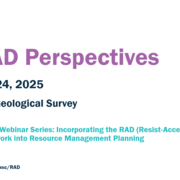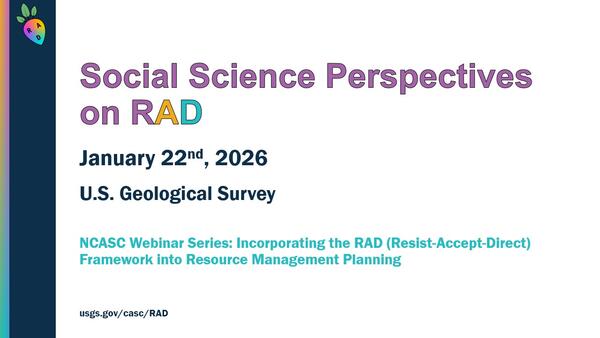RAD is intended to help managers intentionally expand their thinking beyond traditional conservation approaches. Recent interdisciplinary and cross-agency research has integrated the social sciences to explore how and why managers are making RAD decisions.
Laura Thompson, Ph.D.
Laura Thompson is a Research Ecologist with the USGS National Climate Adaptation Science Center (NCASC). Her research focuses on responses of terrestrial species to changes in climate. The purpose of her research is to provide the management community with science-based information that can assist with decision making regarding adaptation options.
Laura received her Ph.D. in Environmental and Life Sciences at Trent University in Peterborough, Ontario where she studied historical and contemporary genetic patterns of woodland caribou in the boreal forest regions of Ontario, Manitoba, and Saskatchewan. Laura also holds M.S. and B.S. degrees in Wildlife and Fisheries Science from the University of Tennessee, Knoxville. Her current research focuses on three themes:
-
The ability of species to abate the impacts of climate change (“adaptive capacity”)
-
Incorporating evolutionary considerations into climate adaptation
-
Uncertainty of climate change impacts and use of decision-support techniques
In addition to the projects listed below, Laura is serving as an author with the Intergovernmental Science-Policy Platform on Biodiversity and Ecosystem Services (IPBES) on the Americas Assessment. She also is serving as an author on the Fourth National Climate Assessment’s (NCA) chapter on biodiversity.
Education and Certifications
Ph.D. in Environmental and Life Sciences, Trent University
M.S. in Wildlife and Fisheries Science, University of Tennessee, Knoxville
B.S. in Wildlife and Fisheries Science, University of Tennessee, Knoxville
Science and Products
Incorporating the RAD (Resist-Accept-Direct) Framework into Resource Management Planning: RAD Perspectives
The Resist-Accept-Direct (RAD) Framework
Webinar: The RAD (Resist-Accept-Direct) Climate Adaptation Framework
'Climate-Smart' Keystone Native Plants for Restoration in a Changing Climate
Developing an Indicator of Species Vulnerability to Climate Change to Support a Consistent Nationwide Approach to Assessing Vulnerability
Evaluating Species’ Adaptive Capacity in a Changing Climate: Applications to Natural-Resource Management in the Northwestern U.S.
Evaluating Species’ Adaptive Capacity in a Changing Climate: Applications to Natural-Resource Management in the Northwestern U.S. (COPY)
Evaluating Species’ Adaptive Capacity in a Changing Climate: Applications to Natural-Resource Management in the Northwestern U.S. (COPY)
Understanding the Effects of Climate Variability and Change on Ungulates in North America
Moose and Winter Ticks in Western Wyoming
Understanding Species' Range Shifts in Response to Climate Change: Results from a Systematic National Review
Responding to Ecosystem Transformation using the Resist-Accept-Direct (RAD) Framework
Single Nucleotide Polymorphism (SNP) genomic data of moose (Alces alces) from the contiguous United States, 2009-2017 Single Nucleotide Polymorphism (SNP) genomic data of moose (Alces alces) from the contiguous United States, 2009-2017
Evaluating the central–marginal hypothesis: Introgression and genetic variation at the trailing edge of Quercus bicolor Evaluating the central–marginal hypothesis: Introgression and genetic variation at the trailing edge of Quercus bicolor
RAD (Resist-Accept-Direct) switch points and triggers for adaptation planning RAD (Resist-Accept-Direct) switch points and triggers for adaptation planning
Scent detection dogs detect a species of hard tick, Dermacentor albipictus, with comparable accuracy and efficiency to traditional tick drag surveys Scent detection dogs detect a species of hard tick, Dermacentor albipictus, with comparable accuracy and efficiency to traditional tick drag surveys
Winter tick sharing between ungulates in the Greater Yellowstone Ecosystem and implications for apparent competition Winter tick sharing between ungulates in the Greater Yellowstone Ecosystem and implications for apparent competition
Exposure, sensitivity, or adaptive capacity? Reviewing assessments that use only two of three elements of climate change vulnerability Exposure, sensitivity, or adaptive capacity? Reviewing assessments that use only two of three elements of climate change vulnerability
Supporting the adaptive capacity of species through more effective knowledge exchange with conservation practitioners Supporting the adaptive capacity of species through more effective knowledge exchange with conservation practitioners
Mechanisms, detections, and impacts of species redistributions under climate change Mechanisms, detections, and impacts of species redistributions under climate change
Bringing traits back in the equation: A roadmap to understand species redistribution Bringing traits back in the equation: A roadmap to understand species redistribution
Existing evidence on the effects of climate variability and climate change on ungulates in North America: A systematic map Existing evidence on the effects of climate variability and climate change on ungulates in North America: A systematic map
Disease-smart climate adaptation for wildlife management and conservation Disease-smart climate adaptation for wildlife management and conservation
Reimagining large river management using the Resist–Accept–Direct (RAD) framework in the Upper Mississippi River Reimagining large river management using the Resist–Accept–Direct (RAD) framework in the Upper Mississippi River
A brave new world: Managing for biodiversity conservation under ecosystem transformation A brave new world: Managing for biodiversity conservation under ecosystem transformation
Non-USGS Publications**
**Disclaimer: The views expressed in Non-USGS publications are those of the author and do not represent the views of the USGS, Department of the Interior, or the U.S. Government.
RAD is intended to help managers intentionally expand their thinking beyond traditional conservation approaches. Recent interdisciplinary and cross-agency research has integrated the social sciences to explore how and why managers are making RAD decisions.
Science and Products
Incorporating the RAD (Resist-Accept-Direct) Framework into Resource Management Planning: RAD Perspectives
The Resist-Accept-Direct (RAD) Framework
Webinar: The RAD (Resist-Accept-Direct) Climate Adaptation Framework
'Climate-Smart' Keystone Native Plants for Restoration in a Changing Climate
Developing an Indicator of Species Vulnerability to Climate Change to Support a Consistent Nationwide Approach to Assessing Vulnerability
Evaluating Species’ Adaptive Capacity in a Changing Climate: Applications to Natural-Resource Management in the Northwestern U.S.
Evaluating Species’ Adaptive Capacity in a Changing Climate: Applications to Natural-Resource Management in the Northwestern U.S. (COPY)
Evaluating Species’ Adaptive Capacity in a Changing Climate: Applications to Natural-Resource Management in the Northwestern U.S. (COPY)
Understanding the Effects of Climate Variability and Change on Ungulates in North America
Moose and Winter Ticks in Western Wyoming
Understanding Species' Range Shifts in Response to Climate Change: Results from a Systematic National Review
Responding to Ecosystem Transformation using the Resist-Accept-Direct (RAD) Framework
Single Nucleotide Polymorphism (SNP) genomic data of moose (Alces alces) from the contiguous United States, 2009-2017 Single Nucleotide Polymorphism (SNP) genomic data of moose (Alces alces) from the contiguous United States, 2009-2017
Evaluating the central–marginal hypothesis: Introgression and genetic variation at the trailing edge of Quercus bicolor Evaluating the central–marginal hypothesis: Introgression and genetic variation at the trailing edge of Quercus bicolor
RAD (Resist-Accept-Direct) switch points and triggers for adaptation planning RAD (Resist-Accept-Direct) switch points and triggers for adaptation planning
Scent detection dogs detect a species of hard tick, Dermacentor albipictus, with comparable accuracy and efficiency to traditional tick drag surveys Scent detection dogs detect a species of hard tick, Dermacentor albipictus, with comparable accuracy and efficiency to traditional tick drag surveys
Winter tick sharing between ungulates in the Greater Yellowstone Ecosystem and implications for apparent competition Winter tick sharing between ungulates in the Greater Yellowstone Ecosystem and implications for apparent competition
Exposure, sensitivity, or adaptive capacity? Reviewing assessments that use only two of three elements of climate change vulnerability Exposure, sensitivity, or adaptive capacity? Reviewing assessments that use only two of three elements of climate change vulnerability
Supporting the adaptive capacity of species through more effective knowledge exchange with conservation practitioners Supporting the adaptive capacity of species through more effective knowledge exchange with conservation practitioners
Mechanisms, detections, and impacts of species redistributions under climate change Mechanisms, detections, and impacts of species redistributions under climate change
Bringing traits back in the equation: A roadmap to understand species redistribution Bringing traits back in the equation: A roadmap to understand species redistribution
Existing evidence on the effects of climate variability and climate change on ungulates in North America: A systematic map Existing evidence on the effects of climate variability and climate change on ungulates in North America: A systematic map
Disease-smart climate adaptation for wildlife management and conservation Disease-smart climate adaptation for wildlife management and conservation
Reimagining large river management using the Resist–Accept–Direct (RAD) framework in the Upper Mississippi River Reimagining large river management using the Resist–Accept–Direct (RAD) framework in the Upper Mississippi River
A brave new world: Managing for biodiversity conservation under ecosystem transformation A brave new world: Managing for biodiversity conservation under ecosystem transformation
Non-USGS Publications**
**Disclaimer: The views expressed in Non-USGS publications are those of the author and do not represent the views of the USGS, Department of the Interior, or the U.S. Government.
RAD is intended to help managers intentionally expand their thinking beyond traditional conservation approaches. Recent interdisciplinary and cross-agency research has integrated the social sciences to explore how and why managers are making RAD decisions.
RAD is intended to help managers intentionally expand their thinking beyond traditional conservation approaches. Recent interdisciplinary and cross-agency research has integrated the social sciences to explore how and why managers are making RAD decisions.












